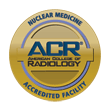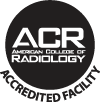 What is Nuclear Medicine?
What is Nuclear Medicine?
Nuclear medicine imaging is a method of photographing the bones, organs, and tissue structures within the body. It can tell your physician not only what your body looks like on the inside, but also how well your organs and tissue structures are functioning. Unlike an x-ray or MRI which provide structural or geographic information only, nuclear medicine records activity on a molecular level.
How does Nuclear Medicine work?
The system works by detecting benign radiation emitted from a radioisotope given to a patient. Once inside the patient, the radioisotope is attracted to a specific organ or area of the body. These areas absorb the radioisotope in quantities greater than that absorbed by surrounding tissues.
When is Nuclear Medicine Used?
Nuclear Medicine is used to help detect early signs of heart, lung, liver, thyroid, bone, or kidney disease, small tumors, or even infections. The amount of radiation received from a nuclear medicine scan is very low—about the same as for a single chest x-ray. Below are some more specific indications that may require the use of nuclear medicine:
- Analyze kidney function.
- Image blood flow and function of the heart.
- Scan lungs for respiratory and blood-flow problems.
- Identify blockage of the gallbladder.
- Evaluate bones for fracture, infection, arthritis or tumor.
- Determine the presence or spread of cancer.
- Identify bleeding into the bowel.
- Locate the presence of infection.
- Measure thyroid function to detect an overactive or underactive thyroid.
How to Prepare
Please let the technologist know if you:
- Are pregnant.
- Have had a nuclear medicine scan before.
- Have had a recent barium study or have used x-ray contrast.
- Have any fractures or artificial joints.
- Have any allergies.
Thyroid Scan and Uptake
- Please do not take any of the following:
- Thyroid hormones 4-6 weeks before your exam.
- Multiple vitamins or iodine supplements within one (1) week before your exam.
- Anti-thyroid medication one (1) week before your exam.
- If you have had an IVP (kidney x-ray), CT, or any other x-ray and were given contrast, you must wait eight (8) weeks before having a nuclear medicine thyroid study.
- Please do not eat or drink anything after midnight prior to your exam.
Gallbladder/HIDA/Hepatobiliary
- Please do not eat or drink anything after midnight prior to your exam.
- Do not take any pain medication for four (4) hours prior to your exam.





